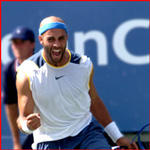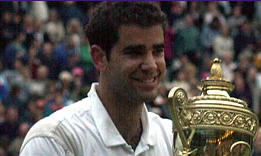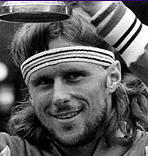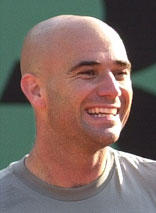
One thing we call learn from Andre Agassi is to just not give up...! He is tenacious, that's for sure. As I write this commentary I'm watching the 2005 US Open men's final. In the first set (Agassi vs Federer) Agassi saved 7 set points before finally succumbing. One thing's for sure, Andre is going to make some noise and go down swinging.
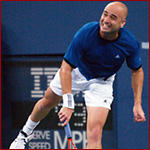
One key to Andre's success is that he takes care of his serving games. Through the semi's he is the tournament ace leader. But then again he has played a lot more games than Federer going into the finals... 117 extra games to be exact. But that's the mark of a 'grinder', someone who hangs in there and just grinds it out. The only problem is that it's tough to grind against a guy like Federer who can hit a winner from pretty much any where in the court.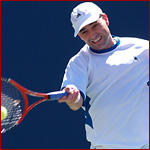
Another key to Andre's success is that his baseline game is solid and his inside out forehand has long been a reliable weapon. He uses an open stance on nearly 100% of his forehands. And he drives his two handed backhand but is able to slice the one hander when he needs to. He mixes up spins very well. He mixes his depths well, too. He's really developed a nice deceptive backhand drop shot that he's been using a lot lately to keep his opponents off balance.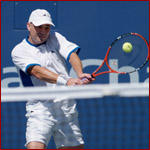
And while we're on the subject of groundstrokes, we shouldn't leave out Andre's return of serve. He's really developed a great all around game through out his career and that's why he's in the finals of the US Open this weekend.
The final testament to Andre is how he really turned his life around. Young players reading this column won't remember when Andre came on the tennis scene as a brash teenager with long, psychedelic hair and a very punky attitude. He had early success winning the French Open, then faded from the radar for awhile. But he had a change of heart in his late 20's. Now, he's beloved by nearly everyone and truly he's become an ambassador for the game of American tennis.
My attitude toward Andre has changed considerably over the years. And now having experienced the joy of the birth of my son and can see how much my life and perspective has changed in just 7 weeks, I understand how marrying Steffi Graf and having kids has had a tremendously positive effect on Andre. I suppose in that regard I identify with him closely.
So today's tip ties in a little with my tennis tip from March 27 on having a role model If you love tennis and want to get better then you need to become a student of the game. And just keeping up with the players and what is happening on the world tennis scene is one way to be a thorough student of the game. As I close this commentary Andre has leveled the match by taking the second set and it's 2 all in the third. What ever happens, Andre will still be an American-Tennis hero in my book....!
Next week: A look at Roger Federer. -You gotta like a guy with a great one handed backhand like that... Too bad he cut off his pony tail... (and too bad he's not American...)

